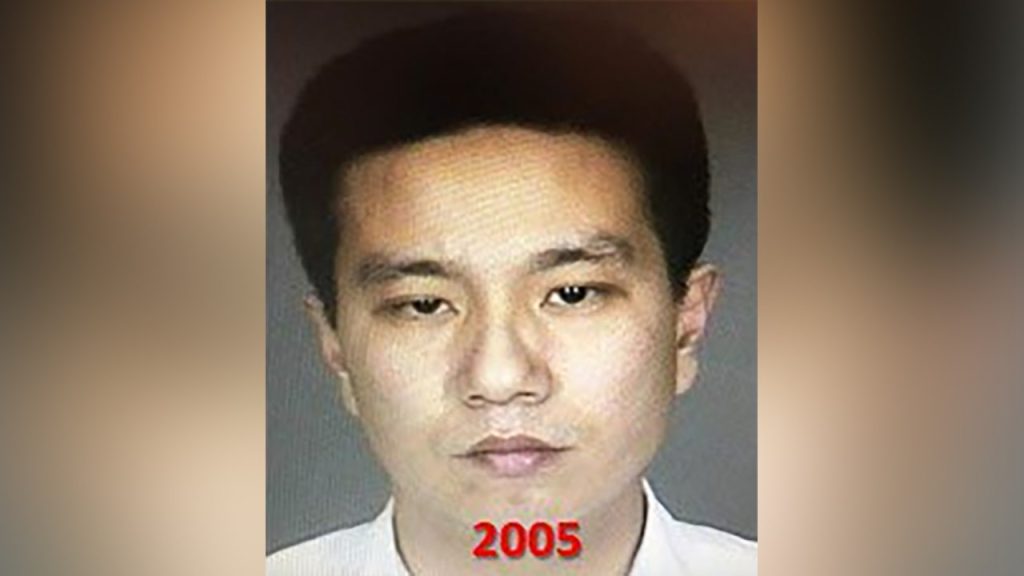After nearly 17 years on the run, a notorious fugitive known as the “Bad Breath Rapist” was finally apprehended by U.S. Marshals and other law enforcement officials in California. Tuen Kit Lee, 55, was arrested by the Pacific Southwest Regional Fugitive Task Force with the help of the Massachusetts State Police and Quincy Police Department. Lee had been on the run since fleeing his trial in September 2007, where he was found guilty of kidnapping and raping a woman in 2005. The victim, a waitress from a restaurant owned by Lee’s family in Quincy, was assaulted at her home by Lee, who wore a mask, held her at knife point, and sexually assaulted her while zip-tying her to the bed.
The victim was discovered by her boyfriend several hours later, bound to the bed. Lee was identified as the perpetrator by the victim, who recognized him by his bad breath, leading to him being dubbed the “Bad Breath Rapist” by the media. After being found guilty of the crimes, Lee fled the state and evaded capture for over 16 years until he was located in Diablo, California. Law enforcement officials received a tip that Lee was living in the area, and after verifying this information, he was taken into custody on Tuesday morning, finally bringing an end to his lengthy run from justice. Chief Inspector Sean LoPiccolo, acting PSWRFTF commander, emphasized the dedication of law enforcement in locating and arresting Lee, bringing closure to the victim and her family.
The arrest of Tuen Kit Lee after nearly two decades on the run serves as a reminder that violent offenders cannot evade accountability for their actions indefinitely. Despite fleeing his trial in 2007 and remaining at large for over 16 years, Lee was eventually located and apprehended in California. The Massachusetts State Police received a tip regarding his whereabouts, leading to an investigation by U.S. marshals in northern California that ultimately confirmed his presence in the area. Lee’s capture is a testament to the persistence and dedication of law enforcement in pursuing fugitives and ensuring that justice is served.
The heinous nature of the crimes committed by Tuen Kit Lee, including the kidnapping and rape of a woman in 2005, underscore the importance of apprehending dangerous fugitives like him. The victim’s harrowing experience of being bound, assaulted, and sexually abused by Lee highlights the devastating impact of violent crimes on individuals and communities. Lee’s evasion of justice for over 16 years following his conviction further emphasizes the necessity of robust law enforcement efforts to locate and apprehend fugitives who seek to evade accountability for their actions.
The arrest of Tuen Kit Lee in California not only brings closure to the victim and her family but also sends a clear message to other violent offenders that they will be pursued and held accountable for their crimes. Chief Inspector Sean LoPiccolo’s statement following Lee’s capture reflects the dedication and commitment of law enforcement to ensure that fugitives are brought to justice, providing peace of mind to victims and their loved ones. The collaboration between various law enforcement agencies, including the U.S. Marshals, Massachusetts State Police, and Quincy Police Department, was instrumental in locating and apprehending Lee, illustrating the importance of coordinated efforts in addressing violent crime and ensuring public safety.
In conclusion, the apprehension of Tuen Kit Lee, the “Bad Breath Rapist,” following nearly 17 years on the run serves as a testament to the tireless efforts of law enforcement in pursuing fugitives and ensuring that justice is served. The heinous crimes committed by Lee and the impact on the victim underscore the importance of holding dangerous offenders accountable for their actions. His capture in California after being on the run since 2007 not only brings closure to the victim and her family but also sends a message that fugitives cannot evade justice indefinitely. The collaborative efforts of various law enforcement agencies in locating and apprehending Lee highlight the critical role of coordinated approaches in addressing violent crime and safeguarding communities.


